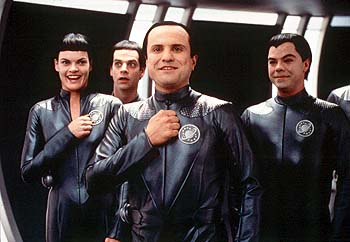I.O.U.S.A.
Posted on April 7, 2009 at 8:00 am
Two guys who are super-smart and super-rich, Warren Buffet and Pete Peterson and one guy who is just super-smart, former Comptroller General of the United States David Walker have a message for Americans — don’t spend money you don’t have.
Think of Maxed Out, the terrifying documentary about the way credit card companies exploit the weak, the vulnerable, and the spendthrifts, crossed with An Inconvenient Truth
, the terrifying documentary about the way the century following the industrial revolution has caused irreparable damage to the earth’s ecosystem, and you have “IOUSA,” which shows us irrefutable evidence that the biggest balloon payment in history is about to come due.
Using the now-familiar combination of folksy faux-archival educational movies, person-on-the-street interviews with completely clueless citizens (“I thought the US was lending money to other countries,” one says when asked about the size of our debt), bad news from a lot of very erudite talking heads and some really, really scary charts, “IOUSA” tells us that while we have been lowering taxes and increasing benefits we have been pushing onto our children and grandchildren the fastest-growing debt load in history. We finance this by selling our debt securities to countries that can afford them, like China. Foreign interests hold more than half of U.S. debt. China owns more than $500 billion worth. So does Japan. The movie says that the inability of Great Britain to defend the Suez Canal in 1956 was in part due to its vulnerability caused by post-WWII debt. It is certain that having countries like China, Japan ($583.3 billion), and the oil exporting countries ($170.4 billion) holding our I.O.U.’s puts a worrisome burden on our ability to engage in diplomatic negotiations.
Most troubling is that the Enron-like accounting that hides the real debt level for political expediency. Just as Enron used “special purpose entities” to keep its debts off the balance sheet, the government does not include Social Security and the costs of other benefit programs in its financial statement. The entitlement programs currently in place will bankrupt the system when the baby boomers start receiving benefits.
It is difficult to make a dry and disturbing subject like budget deficits seem interesting and vital. There are no cuddly polar bears trying to hold on to shrinking ice caps or visceral individual stories like those in Michael Moore’s movies. But this movie makes a devastating case for the consequence of our current “rob Peter to pay Paul” budgetary shell game. It is like fiscal musical chairs; when the music stops, there will be no place to sit.
America has redefined the rules and shown the world new possibilities since our beginning. Now we face the direst challenge in our history — to reverse what has always been the inevitable cycle of history and create sustained growth and prosperity. This movie asks the important questions and makes it clear that it is we who must answer them.

